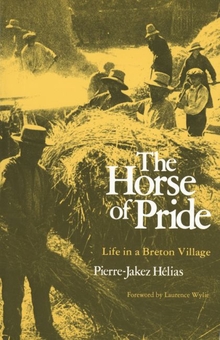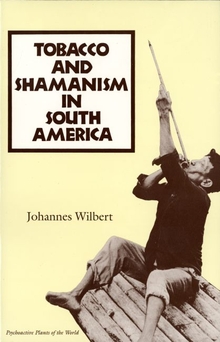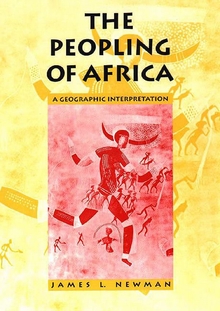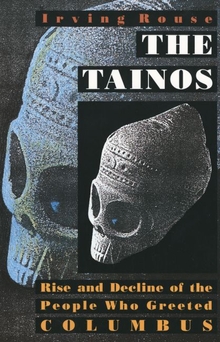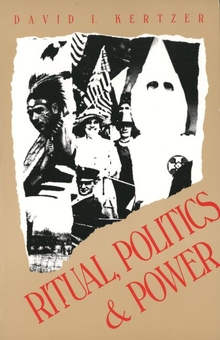The Horse of Pride
WARNING
You are viewing an older version of the Yalebooks website. Please visit out new website with more updated information and a better user experience: https://www.yalebooks.com
Life in a Breton Village
Pierre-Jakez Hélias; Abridged by June Guicharnaud; Foreword by Laurence Wylie
“A marvelous chronicle of Breton lives and life, seen largely through the eyes of a child grown old, remembering how it used to be, in the years between the two world wars. The memoirs are magnificent. . . . The affectionate and touching portraits are not just of one family. . . . but of a whole people. . . . Like that faintly sweet, strong apple liqueur, this book should be savored slowly—set aside and picked up again, chapters read and re-read.”—Neil Pickett, The New Republic
“A rich and moving memoir. . . . We can see why this book won acclaim and a prize in France; it should win our hearts here too.”—Robert Kirsch, Los Angeles Times
“A marvelous book.”—Audrey C. Foote, Washington Post Book World
“A landmark in the art of storytelling. Read it aloud; some passages will bring a catch to your voice. The superb translation by June Guicharnaud echoes the rhythms and tones of spoken language.”—Gloria Levitas, The New York Times Book Review
“The Horse of Pride is solid, detailed, and satisfying, like Breton crochet lace. . . . It speaks to the heart. That is the language beyond language.”—Naomi Bliven, The New Yorker
“A book lovely in every respect; a jewel.”—Edmund Fuller, The Wall Street Journal
“A rich and moving memoir. . . . We can see why this book won acclaim and a prize in France; it should win our hearts here too.”—Robert Kirsch, Los Angeles Times
“A marvelous book.”—Audrey C. Foote, Washington Post Book World
“A landmark in the art of storytelling. Read it aloud; some passages will bring a catch to your voice. The superb translation by June Guicharnaud echoes the rhythms and tones of spoken language.”—Gloria Levitas, The New York Times Book Review
“The Horse of Pride is solid, detailed, and satisfying, like Breton crochet lace. . . . It speaks to the heart. That is the language beyond language.”—Naomi Bliven, The New Yorker
“A book lovely in every respect; a jewel.”—Edmund Fuller, The Wall Street Journal
“A marvelous chronicle of Breton lives and life, seen largely through the eyes of a child grown old, remembering how it used to be, in the years between the two world wars. The memoirs are magnificent. . . . The affectionate and touching portraits are not just of one family. . . . but of a whole people. . . . Like that faintly sweet, strong apple liqueur, this book should be savored slowly—set aside and picked up again, chapters read and re-read.”—Neil Pickett, The New Republic
“A rich and moving memoir. . . . We can see why this book won acclaim and a prize in France; it should win our hearts here too.”—Robert Kirsch, Los Angeles Times
“A marvelous book.”—Audrey C. Foote, Washington Post Book World
“A landmark in the art of storytelling. Read it aloud; some passages will bring a catch to your voice. The superb translation by June Guicharnaud echoes the rhythms and tones of spoken language.”—Gloria Levitas, The New York Times Book Review
“The Horse of Pride is solid, detailed, and satisfying, like Breton crochet lace. . . . It speaks to the heart. That is the language beyond language.”—Naomi Bliven, The New Yorker
“A book lovely in every respect; a jewel.”—Edmund Fuller, The Wall Street Journal
"An account of growing up in Brittany when life was hard, when home was often a room and a loft, and dineer a bowl of potatoes and milk. But life had its poetry still—the beauties of poppy and cornflower fields, the savor of sugar salad and coffee soup."—Washington Post Book World, (Christmas Book Round-Up)
"Often drawing on the experience of his own family, Hélias revives bigouden folklore in all of its material and spiritual manifestations. There is much that seems heroic in this patient and respectful account and, as Wylie notes, its colloquial language has been translated with extraordinary skill."—New York Review of Books
"The Horse of Pride is reported to be a best-seller in France. It deserves a wide and admiring American reading public."—Stuart Brent, ABA Book Review
"An excellent translation has appeared of Pierre-Jakez Hélias's recent work. The book—a bestseller in France—records the life of the Breton peasantry before World War I as seen through the eyes of the author as he grows up. He describes how, although Britanny was officially part of France, it was both physically and linguistically isolated from it. He tells how the poor and largely illiterate peasants often had little more to subsist on than their innate sense of pride and shows how the development of raods and communication in the 20th century finally broke the Breton's isloation. This personal account of a vanished way of life is rich and compelling."—France
"Perhaps the decline of peasant society is one reason this book is so important; it is more than a rich evocative narrative; it is because there are dying societies, institutions and cultures all around us. There are profound implications for our era in this memorable study; it is a microcosm of civilization and what is happening to us."—Miami Herald
"Just how hard life was in Brittany right up to 1939 is revealed in Pierre-Jakez Hélias's moving and often beautiful recollections of his own childhood."—Christian Science Monitor
"Recreates in vivid and unforgettable detail the culture and individuals of a Breton village. What emerges is the image of the last generation of a peasant cultural about to be engulfed by the modern world."—Library Journal
"Filled with charm and a delight in the details of life in a Breton village, this book is more than an autobiography of the noted ethnologist. In the intricate interplay of big farmer and small, of priest and cobbler, what emerges is a book about social organization, ethnic history, and ordinary, yet extraordinary, people's lives. Hélias tells about his childhood village, the poverty and the pride, and he laces his story with customs, ceremonies, and peculiarities of his people. Refreshing and rich."—ALA Booklist
"A best seller in France, this wise, magical memoir returns the reader to a time and place that will evoke envy, nostalgia and interest in all who mourn the loss of a more cohesive, organic, human world. . . . In letting dozens of stories tell themselves naturally, he has recorded the folk ethnography of an entire region."—Publishers Weekly
Nominated for a 1979 National Book Award in Translation
Winner of the 1979 Christophers Award
ISBN: 9780300025996
Publication Date: September 10, 1980
Publication Date: September 10, 1980
368 pages, 6 1/4 x 9 1/4

